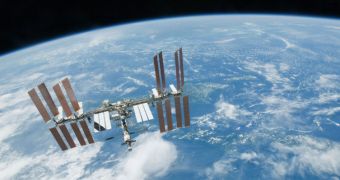Officials at the European Space Agency (ESA) say that the International Space Station (ISS) is currently a successful orbital lab, but add that the station could become so much more with the right plans for development.
In the international scientific community, there are many experts who believe that the ISS is not being utilized at its full potential. They say that it could be used as a platform for conducting visits to other locations in space, such as Mars and the Moon.
Objectively speaking, it would make a lot more sense to assemble a spacecraft in space than to build it on Earth, where everything depends on how large a rocket can be made.
The station would provide the ideal platform to jump start such a construction effort, officials at ESA believe. Expanding the station's use for exploring deeper space is the main theme of a new contest ESA is proposing for interested actors.
The agency has just launched a new call for fresh and challenging ideas, that would see the station being given a more active part in the immediate future of manned space explorations.
According to officials, ESA is very interested into how the station could be used as a testbed for new capabilities and technologies in the immediate future.
Being able to do so would significantly advance our quest of moving space exploration from low-Earth orbit to the Moon, Mars, near-Earth objects (NEO), asteroids, or maybe even other destinations.
The new call for ideas was launched by the ESA Directorate of Human Spaceflight, which is being led by Simonetta Di Pippo. “A new era for the utilization of the International Space Station is about to start,” she said recently.
“This call is intended to support the preparation of a Program Proposal to be submitted to the ESA Member States at the next ESA Ministerial Council in 2012,” the European official explains.
She adds that the request is not part of a formal selection process for the ESA ISS Utilization program. Idea proposals are accepted until November 26, whereas the Letters of Interest need to be submitted by November 5.
“The ISS offers an ideal opportunity for the final testing and initial use of habitation modules and facilities, as well as new robots for maintenance, repairs and handling cargo,” ESA experts say.
“Tele-operations, telecommunications and improved information systems will increase the crew’s autonomy and reduce their dependency on ground support. These can all be tested safely aboard the ISS, before we leap beyond Earth orbit,” they add.

 14 DAY TRIAL //
14 DAY TRIAL //